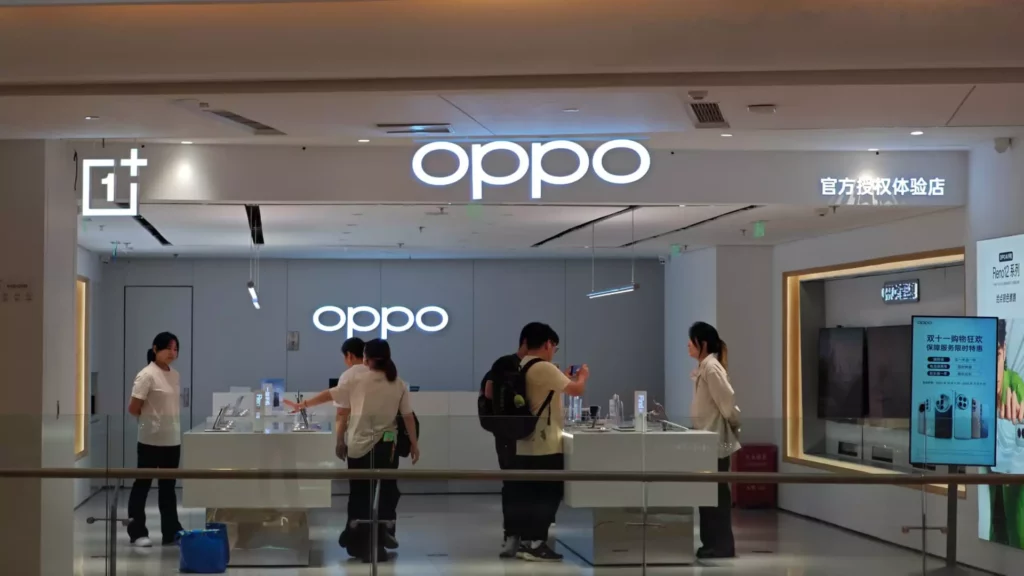The landscape of the smartphone industry is undergoing a seismic shift, with artificial intelligence (AI) taking center stage. Chinese smartphone manufacturer Oppo is at the forefront of this revolution, investing heavily in AI capabilities and establishing strategic partnerships with tech giants Google and Microsoft. As they prepare to unveil their flagship model internationally, the implications of these movements could reshape both consumer expectations and the competitive landscape in the tech sector.
Oppo’s commitment to AI is not merely a superficial enhancement to their product lineup; it represents a strategic shift in how they intend to meet consumer needs. By engaging in weekly discussions with leaders from Google and Microsoft, Oppo aims to leverage advanced AI technologies that are increasingly vital in today’s marketplace. Billy Zhang, Oppo’s president of overseas market sales and services, pointed out that these collaborations are driven by an understanding of consumer pain points, allowing them to innovate effectively.
The importance of these partnerships is amplified by the accelerated growth of generative AI, which has captured the attention of leading tech firms across the globe. With the impending launch of AI-enhanced features on Oppo devices, the company is positioning itself to cater to a growing consumer appetite for smarter and more intuitive technology. By focusing on the integration of tools like Google’s Gemini and Microsoft’s OpenAI capabilities, Oppo aims not just to keep pace with industry standards, but to set new benchmarks.
As of the third quarter of 2023, Oppo has achieved a commendable fourth place in global smartphone shipments, capturing 9% of market share, according to Canalys data. However, the company is acutely aware of the competitive landscape that sees giants like Samsung and Apple leading the charge. Oppo’s strategy includes a considerable focus on growing its presence in European markets while currently holding off expansion into the United States.
Moreover, Oppo’s revenue breakdown shows that approximately 60% comes from international markets, with a significant emphasis on Southeast Asia and Europe, highlighting the company’s strategic priorities and potential growth areas. With AI capabilities expected to enhance user experience, the company is setting the stage to capture a larger market share, particularly among tech-savvy consumers eager for the latest innovations.
Interestingly, Oppo’s commitment to AI extends beyond software enhancements; it’s fundamentally transforming their manufacturing processes as well. The company has acknowledged that automation driven by AI technology can enhance productivity and reduce costs substantially. According to Danny Du, director of manufacturing management at Oppo, integrating advanced technologies into their factories has allowed the company to reduce manufacturing costs by nearly 40% over a three-year period, while also slashing production times.
This shift toward automation has already led to the replacement of 8% of workers with machines on production lines located in Dongguan. This ensures that human labor is focused on higher-level tasks, which could lead to improvements in product quality and overall efficiency. By rolling out digital management systems across facilities in various countries, Oppo is creating a more agile production environment that can rapidly respond to market demands.
Oppo’s bold foray into AI not only positions it competitively within the smartphone market but also suggests broader trends for the tech industry as a whole. The potential for generative AI in smartphones is enormous, with Counterpoint Research predicting shipments of generative AI smartphones could skyrocket to 732 million units by 2028, up from just 46 million in 2022. This statistic underscores the transformative impact AI can have across industries, particularly as companies like Apple and Honor also explore innovative applications of the technology.
The insights gathered from Oppo’s partnerships with key tech players will likely serve as blueprints for other manufacturers looking to enhance their offerings. As the tech landscape continues to evolve, other companies might be inspired to follow Oppo’s lead in prioritizing AI not just for product features but as a cornerstone of operational efficiency as well.
Oppo’s aggressive push into AI illustrates a paradigm shift in how tech companies are approaching product development and consumer engagement. As the landscape is continuously influenced by rapid technological advancement, Oppo’s innovative solutions and strategic partnerships are set to redefine user experiences. The integration of AI into both products and manufacturing processes signifies not only a commitment to staying relevant but also an effort to lead the market into a new age of interconnected technology. As companies scramble to harness the full potential of AI, the race is on to deliver smarter, more effective tools that genuinely enhance our daily lives. For Oppo, the stakes are high, but the future is undoubtedly promising.

